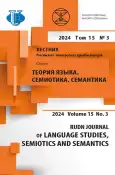Features of the Grammatical (Aspectual) Meaning of Verbal Phraseological Units
- Autores: Marsheuskaya V.V.1
-
Afiliações:
- Yanka Kupala State University of Grodno
- Edição: Volume 15, Nº 3 (2024)
- Páginas: 935-946
- Seção: FUNCTIONAL SEMANTICS, GRAMMAR AND STYLISTICS
- URL: https://journal-vniispk.ru/2313-2299/article/view/323594
- DOI: https://doi.org/10.22363/2313-2299-2024-15-3-935-946
- EDN: https://elibrary.ru/IEBTYF
- ID: 323594
Citar
Texto integral
Resumo
The complexity of the semantic structure of verbal phraseological units, the allocation of grammatical meaning, determining the degree of influence of context on the actualization of the real meaning of individual morphemes in the structure of the basic, verbal component of phraseological units allows consider the study of their particular specific meanings relevant and debatable. The purpose of this study is to identify and analyze the specific specific meanings of verbal phraseological units of the modern Belarusian language. The object of the study is the unambiguous verbal phraseological units of the modern Belarusian language, correlating with different models of simple or complex phrases, the supporting component of which is frozen in the form of only a perfect or only an imperfect form. The subject of the study is the specific meanings of these phraseological units. The main method used in the study was descriptive, the method of dictionary definitions, the method of component and contextual analysis was also used. As a result of the study, it was possible to establish that among the particular grammatical meanings of verbal phraseological units, the core component of which has the form of only a perfect form, the specific actual and potential meanings (possibility or impossibility) of action prevail. The contextual environment of the verbal phraseology (modal verbs, predicative adjectives with modal meaning, predicatives are possible, necessary, impossible), as well as (in the absence of formal indicators) the possibility of replacing the used form of the verbal phraseology with a predicative in combination with its infinitive form indicate the predominance of potential meaning in comparison with the concrete actual one. Verbal phraseological units, the supporting component of which has only an imperfect form, in most cases give a qualitative characteristic of the subject. This may explain the advantage of phraseological units with potentially qualitative and permanently continuous meanings of action. The results obtained can be used in the theory and practice of phraseology of Slavic languages.
Sobre autores
Valiantsina Marsheuskaya
Yanka Kupala State University of Grodno
Autor responsável pela correspondência
Email: tina-2010@bk.ru
ORCID ID: 0009-0006-4621-4620
Código SPIN: 7073-4875
PhD in Philology, Associate Professor of the Department of Belarussian Language of Faculty of Philology
22, Ozheshko str., Grodno, Republic of Belarus, 230023Bibliografia
- Yankouski, Ph.M. (1981). Belarusian phraseology. Minsk: Narodnaya asveta. (In Belarus.).
- Aksamitau, A.S. (1978). Belarusian phraseology. Minsk: Vysheishaya shkola. (In Belarus.).
- Lepeshau, I.Ya. (1984). Problems of phraseological stylistics and phraseological norms. Minsk: Navuka і tekhnіka. (In Belarus.).
- Danіlovіch, M.A. (1991). Grammatical characteristics of phraseological units. Mіnsk: Navuka і tekhnіka. (In Belarus.).
- Danilovich, M.A. (2003). Belarusian dialect phraseology and its lexical basis. Grodno. (In Belarus.).
- Liashchynskaya, V.A. (2015). Basic concepts of the phraseological picture of the world of Belarusians. Minsk. (In Belarus.).
- Lepeshau, I.Ya. (1998). Phraseology of the modern Belarusian language. Minsk. (In Belarus.).
- Liashchynskaya, V.A. (2019). Idiomatics of the Belarusian language in linguistic and cultural coverage. Minsk. (In Belarus.).
- Butko, A.S. (2020). Phraseosemantic field «relations between people» in the Belarusian and French languages [dissertation]. Minsk. (In Belarus.).
- Liashchynskaya, V.A. (2020). Two fragments of the phraseological picture of the world of Belarusians. Minsk: NIHE. (In Belarus.).
- Yakshuk, L.M. (2006). Noun phraseological units in the modern Belorussian literary language: Grodno: GrSU. (In Belarus.).
- Lepeshau, І.Ya. (2010). Category of the type of verbal phraseological units. Belarusian linguistics, 64, 17–25. (In Belarus.).
- Marsheuskaya, V.V. (2019). Semantic and grammatical characteristics of phraseological units with sentence structure. Grodno: JurSaPrint. (In Belarus.).
- Zhukov, V.P. (1975). On the sign character of phraseological units. Questions of linguistics, 6, 36–45. (In Russ.).
- Zhukov, V.P. & Zhukov, A.V. (1980). Morphological characteristics of phraseological units of the Russian language. Leningrad. (In Russ.).
- Nikonovaite, F.I. (1979). Category of the type of phraseological units [dissertation]. Leningrad. (In Russ.).
- Lebedinskaya, V.A. (1987). Procedural phraseological units of the modern Russian language. Chelyabinsk. (In Russ.).
- Chepasova, A.M. (2006). Semantic and grammatical classes of Russian phraseological units. Chelyabinsk: CSPU. (In Russ.).
- Chepasova, A.M. (2016). Selected works. Vol. 2. Phraseology in the context of modern linguistic research. Chelyabinsk: CSPU. (In Russ.).
- Kazarchuk, I.G. (2015). Features of the species correlation of procedural phraseological units with the semantics of the relationship. Vestnik of Kostroma state university, 1, 125–128. (In Russ.).
- Bondarko, A.V. (1971). Type and tense of the Russian verb (meaning and usage). Moscow: Prosveshchenie. (In Russ.).
- Titarenko, E.Ya. & Balatskaya, Yu.Yu. (2022). Aspectuality and variability of verbal phraseological units in the Russian language and speech. Scientific dialogue, 11(3), 152–170. (In Russ.).
- Marsheuskaya, V.V. (2021) Syntactic functioning of verbal phraseological units with atypical structure. Proceedings of the National Academy of Sciences of Belarus. Humanitarian Series, 66(4), 443–449. (In Belarus.).
- Marsheuskaya, V.V. (2021). Semantic groups of verb phraseological units of perfect type. Belarusian language and literature, 8, 50–55. (In Belarus.).
- Marsheuskaya, V.V. (2021). Semantic groups of verbal phraseological units of imperfect type. A native word, 10, 40–42. (In Belarus.).
Arquivos suplementares









